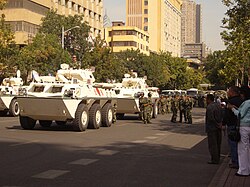Police (china)
The police in the People's Republic of China is more politicized than in many other countries. There are a number of police services and troops, some of which are very strong, some of which are civilian and some of which are paramilitary, but their activities have so far been little researched. The areas of competence of the various police administrations sometimes overlap very strongly.
Carrier of police functions
Under the Police Act of 1995, the Chinese police force consists of five police organs: the public security and state security police, the prison police, the judicial police and the police of the People's Procuratorate.
Ministries and administrations that oversee police functions are
- Ministry of Public Security with the Public Security Police, which are locally organized and not responsible for serious criminal cases, and the
- Ministry of State Security , which itself has police rights and u. a. is responsible for behavior monitoring, internet control, international espionage and counter-espionage
- Ministry of Justice with the People's Police of the Ministry of Justice

There are also other police powers:
- Armed People's Police of the Central Military Commission (barracked, paramilitary, belonged to the People's Liberation Army until 1983 )
- military police
- Administration for the Safety of Maritime Transport of the People's Republic of China
- General Customs Administration (China)
The largest police body is the public security police with 1.9 million employees. The People's Armed Police are said to comprise 400,000 to 1 million military trained.
Hong Kong
The Hong Kong Police Force (HKPF) (Chinese: 香港 警務處), founded in 1844 as the Royal Hong Kong Police Force (RHKPF), which violently suppressed unrest organized by communists and trade unions in 1967 . She now has approximately 37,000 dependents with the Hong Kong Auxiliary Police Force and the Water Police. This means that Hong Kong has the densest police force in the world in relation to its population.
There is also the
- Independent Commission Against Corruption (Chinese: 廉政 公署)
- Hong Kong Correctional Services Department (English: Hong Kong Correctional Services Department, Chinese: 懲 教 署)
- Immigration Department (English: Immigration Department, Chinese: 懲 教 署)
- Customs and Excise Department
Macau
In Macau there are two security agencies, both on below police forces command have
- Corpo de Polícia de Segurança Pública (CPSP) (Chinese: 治安 警察局, English: Public Security Police Force of Macau , German: Police of the public security)
- Judicial police (Chinese: 司法 警察局)
Police reforms in 2000 and 2017/18
The influence of the police is considerably greater than that of the public prosecutor's offices and courts, which repeatedly leads to abuse of office. In 2000 the police were reformed, the main aim of which was to improve the low professionalism of the police at the local level. However, this did not prevent a legitimation crisis of the police organs triggered by increased local unrest. Around 2003 there were again massive attacks by the police, which sparked scandals. Persistent problems are the difficulties in implementing central reforms locally, as well as the interdependence of the local police with local rulers and private security services, and corruption.
A new police reform in 2017/18 completely reorganized the People's Armed Police and reports directly to Secretary General Xi Jinping . She is heavily armed, u. a. with armored vehicles of the type WZ551 . Their main task is to work in unrest (so-called "mass incidents ", Chinese qúntǐ xìng shìjiàn àn ).
Mechanization of surveillance
In recent times, more and more technical aids have been used to monitor behavior, which, in addition to “citizen assessment” by means of ranking in a social credit system, also serve to initiate police measures for direct monitoring of those affected.
In Xinjiang and on the borders with Kyrgyzstan , the border police are running spying software on the Android phones of those entering the country, which searches and saves contacts, calendars, SMS and call lists. Muslim tourists are particularly affected.
Activities abroad
The Chinese police presence abroad has been increasing since around 2015. B. in Serbia , supposedly to increase the feeling of security of Chinese tourists. More and more agreements on police cooperation are also being concluded with other countries. China is also trying to make better use of existing multilateral institutions to track down suspects (possibly including political refugees) living abroad or to repatriate funds that have flown abroad as a result of economic crimes. In September 2018, China arrested the Chinese Interpol President Meng Hongwei , who has been in office since November 2016, for corruption while visiting his home country.
literature
- Kam C. Wong: Police Reform in China. E-book, Taylor and Francis, 2011, ISBN 978-1-1381-1186-8 .
- Yue Ma: The Police System in China. In: The Routledge Handbook of Chinese Criminology. Edited by Liqun Cao, Ivan Y. Sun, and Bill Hebenton. London and New York: Routledge 2014.
- Chi-kwong Sonny Au: Police Reform in Contemporary China: a Study of Community Policing in Hong Kong and Mainland China. Dissertation, University of Hong Kong 2017. DOI: 10.5353 / th_b4501275.
- Suzanne E. Scogging: Policing Modern China. In: China Law and Society Review , 3 (2018) 2, DOI: https://doi.org/10.1163/25427466-00302001 .
Individual evidence
- ↑ Yu Ma 2014, p. 64.
- ^ Protests against needle attacks in: tagblatt.ch, September 5, 2009.
- ↑ Yue Ma 2014, p. 64.
- ↑ Website about the organization of the Hong Kong Police Force (PDF engl./chnines.)
- ↑ Kam C. Wong 2011.
- ↑ Gerhard Piper: Hong Kong: Deployment of the armed people's police on heise.de, August 21, 2019.
- ↑ Chinese border police apparently spy on tourists using an app on spiegel.de, July 2, 2019.
- ↑ Vanessa Steinmetz: Why Chinese police officers patrol Belgrade on spiegel.de, October 30, 2010.
- ↑ Thomas Eder, Bertram Lang, Moritz Rudolf: China in international police and judicial cooperation , ed. from the Mercator Institute for China Studies on merics.org, September 14, 2017.